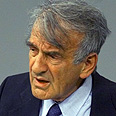Thirty-seven Nobel laureates from around the world signed a petition in support of the Israeli academia and denounced sanctions imposed on institutions of higher learning in Israel.
Chairperson of the Committee of University Heads Professor Rivka Carmi welcomed the initiative, which confers in her words "full international support and legitimization".
"We, the undersigned Nobel Laureates, appeal to students, faculty colleagues and university officials to defeat and denounce calls and campaigns for boycotting, divestment and sanctions against Israeli academics, academic institutions and university-based centers and institutes for training and research, affiliated with Israel", stated the Nobel laureates petition.
Among the signatories are 1986 Nobel Peace Prize winner Elie Wiesel, Nobel Physics laureate Andre Geim of Manchester University and of course, Israelis Avram Hershko, Israel Uman and Aharon Chechanover. 2009 Nobel Chemistry Prize laureate Ada Yonat was not among those who signed.
The Nobel laureates clarified that they believe that "an academic and cultural boycott is contradictory to the principals of academic and scientific freedom, contradictory to the principals of freedom of expression of research and creates discrimination by virtue of national origin.
"We, and many like us, have dedicated ourselves to improving the human condition by doing the often difficult and elusive work to understand complex and seemingly unsolvable phenomena. We believe that the university should serve as an open, tolerant and respectful, cooperative and collaborative community engaged in practices of resolving complex problems."
Furthermore, the petition called on "students, faculty colleagues and university officials to promote and provide opportunities for civil academic discourse where parties can engage in the search for resolution to conflicts and problems rather than serve as incubators for polemics, propaganda, incitement and further misunderstanding and mistrust."
'Impressive declaration'
Chairperson of the Committee of University Heads Professor Rivka Carmi welcomed the petition which was sent to her Ben Gurion University office in on Monday. This is a declaration from the world's scientific greats which can significantly strengthen the international standing of Israeli universities", she noted.
Carmi responded to the petition signatories: "I was pleased to note that we see eye to eye over the importance of academic freedom, openness to conceptual thought and tolerance towards the other, and I wish to thank you for your support. I believe that the enlistment of such respected, first class academics that condemn the phenomenon is of the greatest importance and I hope that their call will fall on attentive ears and will prevent future calls for academic and cultural boycotts".
Professor Carmi told Ynet that she was touched by the letter and was surprised by the number of laureates who decided to stand by the Israeli academia and expressed complete support for its work. "There is no doubt that this is an impressive declaration which confers full international support and legitimization while delegitimizing our opponents' claims."
Carmi mentioned that work on the initiative commenced two months ago, over fears of an academic boycott from Johannesburg University in South Africa. "We contacted an international forum of lecturers for peace who happily responded to our pleas and promised to support us and aid the Israeli academia in its struggle", said Carmi.
"A few weeks later we found out that the forum was trying to raise support of Nobel laureates and I was sure they would manage to reach one or two laureates who would publicly support Israel but when I saw the full list of signees, I was very touched and couldn't remember when we last received such sweeping support from the international scientific community", Carmi added.
"It is always good to know that there are sane and balanced people who understand that we aren't the world's greatest enemy" she said. "Truthfully the factions who support boycotts both in Israel and around the world are marginal, but the resonance of media support they receive is vast, and so the Nobel laureate petition helps bring them back to their natural size."
Professor Carmi referred to Education Minister Gideon Sa'ar's statements where he said that the Council for Higher Education intends to publish an ethical code of basic principles to avoid hurting academic freedom.
"The Council for Higher Education is the natural stage for the debate of issues like the publication of an ethical code, but the act of holding the debate in itself doesn't necessarily mean that the proposal will be accepted. Either way, the academic guidelines must maintain pluralism, balance between facts and respect for different opinions. In no way will we allow a foreign body, especially a political one, to interfere in the Higher Education Council's considerations."
- Follow Ynetnews on Facebook
















